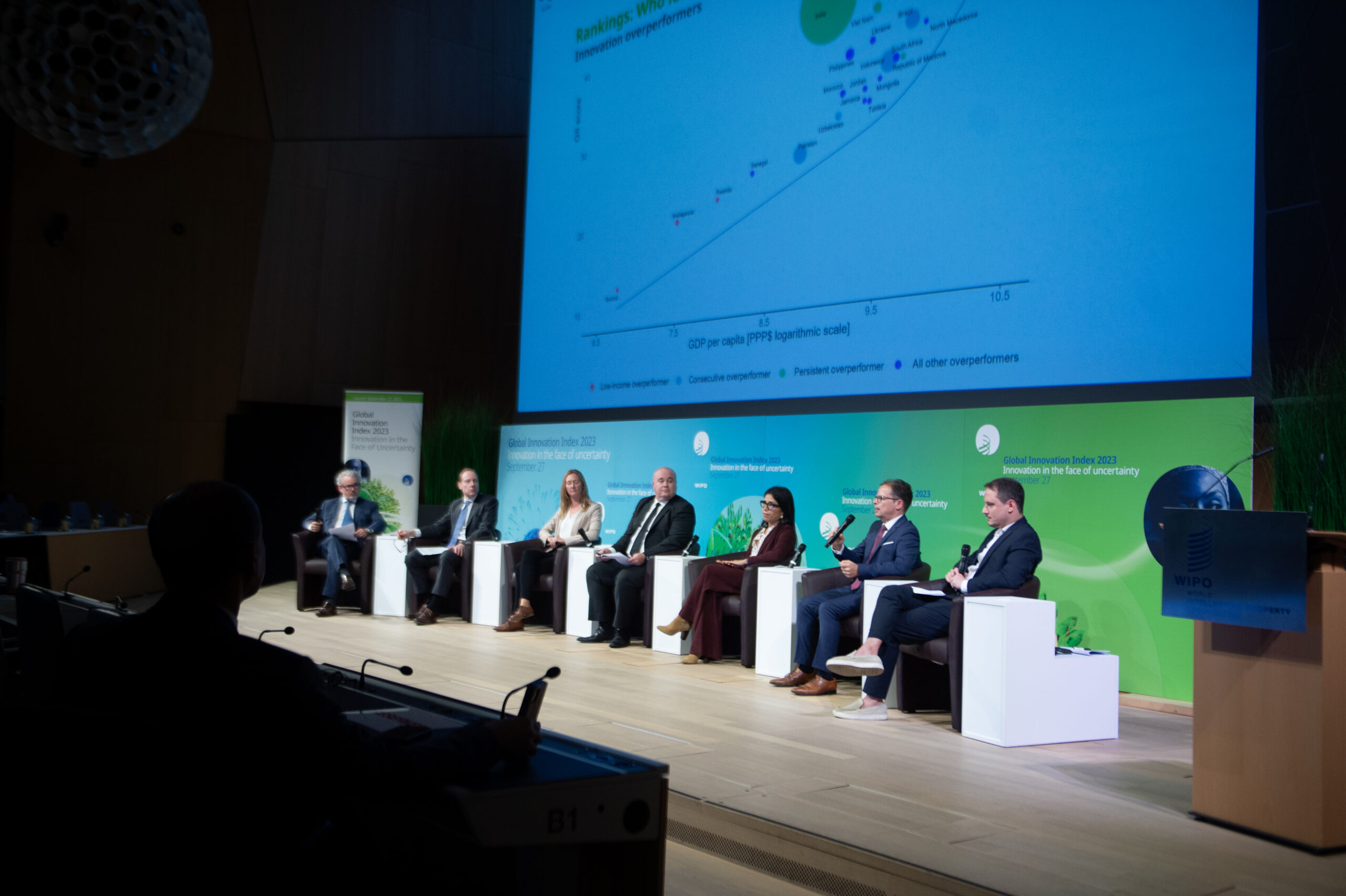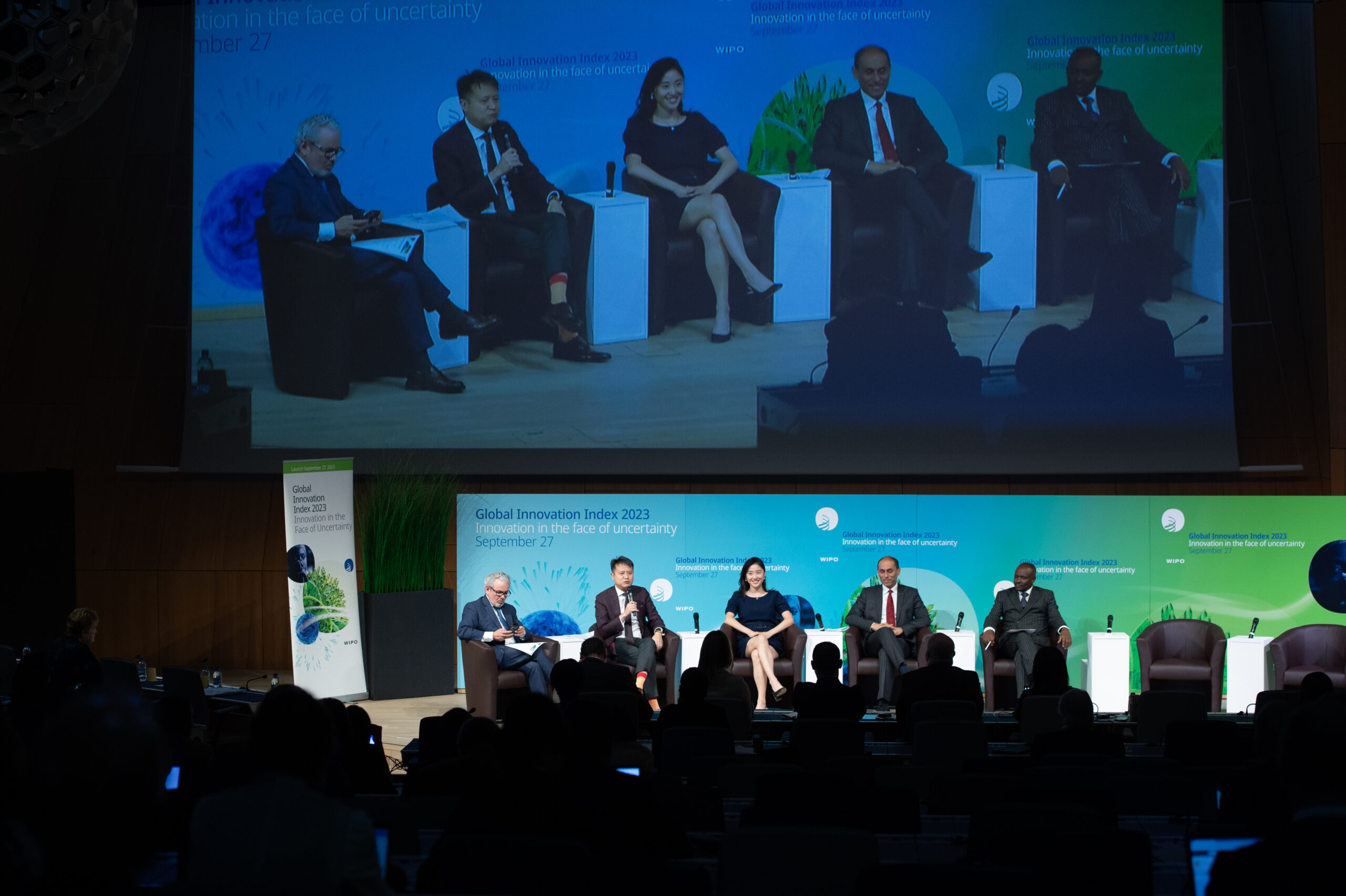The 16th edition of the Global Innovation Index (GII) has launched, revealing the most innovative economies in the world, and providing insights into the current state of global innovation amidst an environment of economic uncertainty.
The global launch event, held in Geneva on September 27th brought together ministers, heads of states, business leaders, academics, and innovation experts from around the world.
The event opened with remarks by Mr. Daren Tang, (Director General, WIPO), introducing this year’s theme “Innovation in the Face of Uncertainty”. Many key indicators of technological progress, like R&D expenditure, are on the rise, however geopolitical and economic disruptions, high inflation, coupled with the lingering effects of high interest rates, are hampering global growth and innovation. Going forward, a key challenge will be converting the potential of promising innovation waves into tangible benefits that flow to everyone, everywhere.
“In this uncertain innovation environment, supporting countries at all stages of development to strengthen innovation ecosystems continues to be a key objective for the GII. We will continue providing support for policymakers in looking at how IP and innovation can become an engine of growth and development.” – Mr. Daren Tang, Director General, WIPO
Mr. Ferdinand Marcos Jr. (President, Philippines), acknowledged the Philippines’ progress in the GII over the past decade, reflecting the nation’s increased prioritization of national development and economic growth.
“GII rankings elevate the Philippines’ status as an economic power and an innovation achiever in the region and in the world. This leverages our innovation, capital, market opportunities, investment in infrastructure, and our people’s creativity and strength, as we aim to uplift our people’s livelihoods in a new age of development.” – H.E. Mr. Ferdinand Marcos Jr., President, Philippines
Ms. Kaja Kallas (Prime Minister, Estonia), shared Estonia’s experiences towards becoming an innovation-driven society. The nation put in place its Research, Development, Innovation and Entrepreneurship Strategy 2035 three years ago. Today, Estonia is the birthplace of ten unicorns, the highest per capita of any economy.
“In Estonia, we think of innovation not only in terms of innovative products or groundbreaking technologies. We think of it as a means to improve the living standards for the society as a whole. For a small country like Estonia, moving to an innovation-driven economy has been the path to success.” – H.E. Ms. Kaja Kallas, Prime Minister, Estonia
Mr. Ulf Kristersson (Prime Minister, Sweden) underscored the role of governments towards creating the right environment to foster innovation and entrepreneurship, evidenced by Sweden’s reclaiming of second place in the GII rankings.
“The green and digital transformation is changing the economy in our societies. The need to transform has put forward new requirements, a need to co-create, in an environment where technology, user behavior, culture, business models, policies and regulations interact.” – H.E. Mr. Ulf Kristersson, Prime Minister, Sweden
Mr. Mmusi Kgafela, Minister for Investment, Trade and Industry, Botswana and Ms. Raquel Buenrostro Sánchez, Secretariat of the Economy, Mexico both emphasized the power of international collaboration in advancing innovation.
“We are eager to forge partnerships with other nations, institutions, and organizations to share knowledge, expertise and best practices. Together, we can address global challenges such as climate change, health care and poverty by leveraging the collective power of innovation.” – H.E. Mr. Mmusi Kgafela, Minister for Investment, Trade and Industry, Botswana
“The world faces significant economic challenges, therefore international cooperation and the establishment of policies that create favorable business environments for investment will be critical to trigger innovation in our countries, contributing to increasingly fair, equitable and sustainable economic development in our countries” – H.E. Ms. Raquel Buenrostro Sánchez, Secretariat of the Economy, Mexico
Marco Alemán (Assistant Director General, IP and Innovation Ecosystems Sector, WIPO) led a Q&A session with GII 2023 co-authors. The contributors shared some key findings from the report, innovation and investments trends, and views on the future of innovation.

Amidst growth in scientific publications, international patent filings, and R&D spending, there was a marked deterioration in the global environment for innovation finance, with venture capital flows decreasing significantly.
“We must keep these adverse financial developments in perspective, the overall financial system has remained fairly stable and venture capital continues to flow, with startups in the generative AI space, for example, continuously mobilizing funding.” – Carsten Fink, Chief Economist, WIPO
The Global Innovation Tracker observed healthy growth in technology adoption, which is slowly but surely making access to safe sanitation and broadband connectivity more widespread. However, overall penetration rates remain medium-to-low for most technology adoption indicators, and measures of the socioeconomic impact of innovation suggest weak, if not declining progress for the second year in a row.
When looking at the geographical distribution of innovation, the top five leading S&T clusters are all located in Asia, with Tokyo–Yokohama (Japan) leading once again. Southeast Asia, East Asia and Oceania has 37 clusters, with 24 being in China, marking the first year China passes the United States in total number of clusters ranking in the top 100. Many clusters also fall in Europe (29) and North America (25).
“Innovation is taking place all over the world, and geographical innovation clusters are playing a key role in pushing this movement forward in a positive way.” – Marco Alemán, Assistant Director General, IP and Innovation Ecosystems Sector, WIPO
Key highlights from this year’s country rankings include:
- Switzerland, Sweden, the United States, the United Kingdom, and Singapore are the world’s most innovative economies in 2023.
- Europe claims 16 of the top 25 spots.
- Latin America hosts the most middle-income economies with unicorn companies, including Argentina, Chile, Colombia, Ecuador, and Mexico.
- Several middle-income economies continue to climb in the rankings, showing resilience. Namely, China, Türkiye, India, Viet Nam, the Philippines, Indonesia, and the Islamic Republic of Iran.
- India, the Republic of Moldova, and Viet Nam continue to be record holders, performing above expectations relative to GDP for a 13th consecutive year.
- The US tops the charts with 651 unicorn companies, with China and India following. Several startups that became unicorns in the last decade, such as SpaceX, ByteDance (TikTok), or OpenAI, have become giants in their industries.
“Middle income economies have risen consistently in the rankings in past years. These economies have young and educated workforces, are emerging markets with potential for rapid growth, and have notably used digitalization to transform their economies.” – Lorena Rivera León, Co-editor, GII, WIPO
A panel discussion on the report’s theme revealed insights from experts on the future of innovation, and advice for supporting innovation performance in their country or region.
“Over the past 16 years, innovation has become a much broader concept. It is not just an economic issue: it also provides social motivation, and has become increasingly accessible, particularly for young people. Making socially conscious and ethical innovation decisions is becoming increasingly critical to promoting inclusive and sustainable development for our world.”
“The nations that are succeeding in innovation today have a clear national leadership vision, are promoting human capital growth through educational institutions, and investing heavily in digitalization.” – Soumitra Dutta, Founder of the GII and Dean, Saïd Business School
“For a while, innovation has been just about technology and IP, however, policymakers are increasingly noticing its social value and creating incentives for investors. The GII helps to demystify many aspects of innovation.” – Tonny K Omwansa, CEO, Kenya National Innovation Agency
“Governments must step up in building trustworthy innovation ecosystems that champion IP protection and can withstand environmental and social challenges and crises.” – Maria Fernanda Garza, Chair, International Chamber of Commerce
“In recent years we have seen shifts in investment trends towards socially responsible innovation, for example climate technologies. People are adjusting to the new normal post-pandemic, and investors are being more thoughtful about valuation.” – Cecilia Zhao, Venture and Growth Investor, Kinnevik


Officially in its 16th edition, the Global Innovation Index remains a powerful tool for developing and evaluating policies to promote innovation, and benchmarking progress on the regional and global scale.
The 2023 edition is now available for download here.
Read the full press release here.
Images provided by WIPO via Flickr.



